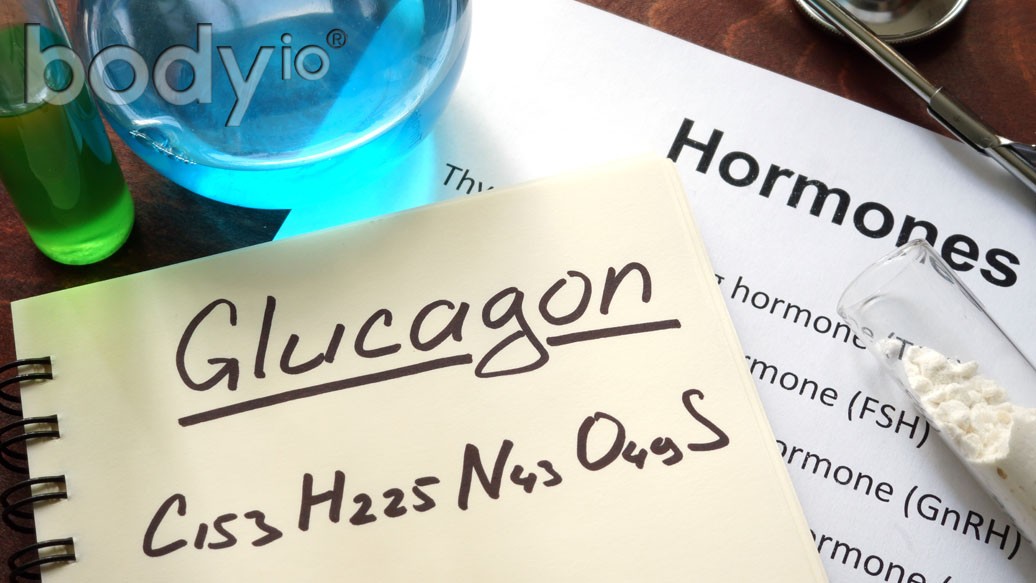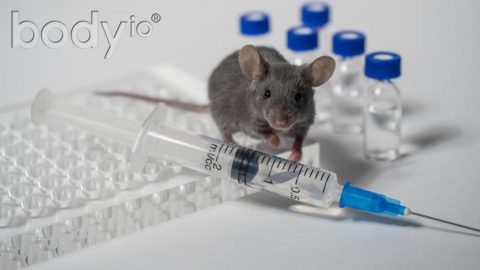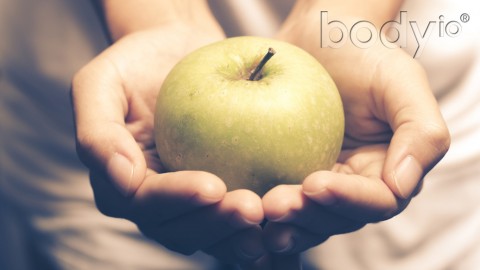More material from my original research notes:
Your body needs to maintain a supply of fuel, and glucagon is a crucial part of this system. Considering the ample access people have to quality food, at least in America with all of our supermarkets and restaurants, glucagon is seldom seen in high quantities in the average human. Essentially, if all is well with your food intake, glucagon isn’t much of a concern.
What’s the point, then? What is glucagon, and what does it do?
Glucagon primarily serves one major purpose: To provide energy for the body when carbohydrate intake is low or carbohydrate stores are running out[1, 2]. When your body isn’t getting enough carbohydrates from your diet, glucagon moves into action. This is why high levels of glucagon can be both beneficial and disastrous, depending on what you eat.
The disastrous part of the process happens because glucagon will take protein and other non-fatty molecules and turn them into sugar, a process known as gluconeogenesis[3-17, 76, 77, 81], meaning there will be less protein available for tissue repair. If your levels of glucagon get too high, even protein from your muscles or organ tissue will be used to make sugar[7, 18-33, 73-78].
Glucagon is beneficial because it will increase the rate of ketone production[17, 34-47, 82, 84] and fat burning[8, 17, 34, 38-40, 43, 47-53]. Making sugar from protein appears to be glucagon’s preference unless there’s a large amount of fat floating around to be turned into ketones[19, 21, 37, 54, 55, 76]. There is little evidence to refute any of this: sugar production[56], ketone production[57], or fat burning[54, 58, 59].
Of course, we’d love glucagon to perform like a good little hormone, making ketones and burning fat. This would also decrease the amount of triglycerides produced, meaning lower levels in the blood and prevention of any new fat storage[8, 40, 50]. At the same time, holding glucagon back from any of its negative activities is equally as important, because you don’t want your body to eat itself to make sugar.
Being digested slowly from the inside out doesn’t sound pleasant to me. More importantly, it’s not healthy.
Whether glucagon is doing good things or bad things depends completely on how much sugar is in your system—and, consequently, how much insulin in present. When insulin levels are elevated, glucagon is unable to do much of anything[6, 34, 39, 45, 49, 60-67, 83].
In actuality, glucagon can make enough sugar from protein to cause a release of insulin[9, 15, 34, 47, 57, 68-72, 79, 80], and this stops glucagon from being able to accomplish anything further. Fortunately, it can only stop itself from being bad. It’s can’t stop itself from being good. It’s the perfect little hormone if we remember to keep insulin under wraps.
Glucagon is yet another very important hormone to consider when designing a diet for fat loss. The fact that it’s seldom ever factored in—or even mentioned—is a clear sign that people aren’t doing their homework. Both Carb Backloading™ and The Carb Nite® Solution will show you how we can use food to keep glucagon burning fat.
[expand title=”References (click to expand)”]
- Benson JW Jr, Johnson DG, Palmer JP, Werner PL, Ensinck JW. Glucagon and catecholamine secretion during hypoglycemia in normal and diabetic man. J Clin Endocrinol Metab. 1977 Mar;44(3):459-64. -1-132-
- Liu D, Adamson U, Lins PE, Clausen-Sjobom N. An analysis of the glucagon response to hypoglycaemia in patients with type 1 diabetes and in healthy subjects. Diabet Med. 1993 Apr;10(3):246-54. -1-133-
- Surmely JF, Schneiter P, Henry S, Paquot N, Jequier E, Tappy L. Effects of glucagon in the control of endogenous glucose production in man. 1999 Apr;15(4):267-73. -1-42-
- Chhibber VL, Soriano C, Tayek JA. Effects of low-dose and high-dose glucagon on glucose production and gluconeogenesis in humans. 2000 Jan;49(1):39-46. -1-44-
- Dirlewanger M, Schneiter PH, Paquot N, Jequier E, Rey V, Tappy L. Effects of glucocorticoids on hepatic sensitivity to insulin and glucagon in man. Clin Nutr. 2000 Feb;19(1):29-34. -1-45-
- Genuth SM, Hoppel CL. Acute hormonal effects on carnitine metabolism in thin and obese subjects: responses to somatostatin, glucagon, and insulin. 1981 Apr;30(4):393-401. -1-46-
- Nair KS, Halliday D, Matthews DE, Welle SL. Hyperglucagonemia during insulin deficiency accelerates protein catabolism. Am J Physiol. 1987 Aug;253(2 Pt 1):E208-13. -1-50-
- Soltesz G, Molnar D, Kardos M, Baranyai Z. Effect of glucagon infusion on some plasma metabolites and hormones in obese children. Acta Paediatr Acad Sci Hung. 1982;23(2):137-43. -1-58-
- Tse TF, Clutter WE, Shah SD, Cryer PE. Mechanisms of postprandial glucose counterregulation in man. Physiologic roles of glucagon and epinephrine vis-a-vis insulin in the prevention of hypoglycemia late after glucose ingestion. J Clin Invest. 1983 Jul;72(1):278-86. -1-86-
- Liljenquist JE, Mueller GL, Cherrington AD, Keller U, Chiasson J-L, Perry JM, Lacy WW, Rabinowitz D. Evidence for an important role of glucagon in the regulation of hepatic glucose production in normal man. J Clin Invest. 1977 Feb;59(2):369-74. -1-104-
- Chiasson JL, Liljenquist JE, Sinclair-Smith BC, Lacy WW. Gluconeogenesis from alanine in normal postabsorptive man. Intrahepatic stimulatory effect of glucagon. 1975 Jun;24(6):574-84. -1-110-
- Lewis GF, Vranic M, Giacca A. Glucagon enhances the direct suppressive effect of insulin on hepatic glucose production in humans. Am J Physiol. 1997 Mar;272(3 Pt 1):E371-8. -1-113-
- Stevenson RW, Steiner KE, Davis MA, Hendrick GK, Williams PE, Lacy WW, Brown L, Donahue P, Lacy DB, Cherrington AD. Similar dose responsiveness of hepatic glycogenolysis and gluconeogenesis to glucagon in vivo. 1987 Mar;36(3):382-9. -1-115-
- Attvall S, Fowelin J, von Schenck H, Smith U, Lager I. Insulin-antagonistic effects of pulsatile and continuous glucagon infusions in man–a comparison with the effect of adrenaline. J Clin Endocrinol Metab. 1992 May;74(5):1110-5. -1-116-
- Sherwin R, Wahren J, Felig P. Evanescent effects of hypo- and hyperglucagonemia on blood glucose homeostasis. 1976 Nov;25(11 Suppl 1):1381-3. -1-118-
- Guttler F, Kuhl C, Pedersen L, Paby P. Effects of oral phenylalanine load on plasma glucagon, insulin, amino acid and glucose concentrations in man. Scand J Clin Lab Invest. 1978 May;38(3):255-60. -1-121-
- Gerich JE, Lorenzi M, Bier DM, Schneider V, Tsalikian E, Karam JH, Forsham PH. Prevention of human diabetic ketoacidosis by somatostatin. Evidence for an essential role of glucagon. N Engl J Med. 1975 May 8;292(19):985-9. -1-162-
- Tessari P, Inchiostro S, Barazzoni R, Zanetti M, Vettore M, Biolo G, Iori E, Kiwanuka E, Tiengo A. Hyperglucagonemia stimulates phenylalanine oxidation in humans. 1996 Apr;45(4):463-70. -1-19-
- Boden G, Tappy L, Jadali F, Hoeldtke RD, Rezvani I, Owen OE. Role of glucagon in disposal of an amino acid load. Am J Physiol. 1990 Aug;259(2 Pt 1):E225-32. -1-21-
- Nair KS. Hyperglucagonemia increases resting metabolic rate in man during insulin deficiency. J Clin Endocrinol Metab. 1987 May;64(5):896-901. -1-25-
- Charlton MR, Adey DB, Nair KS. Evidence for a catabolic role of glucagon during an amino acid load. J Clin Invest. 1996 Jul 1;98(1):90-9. -1-32-
- Marchini JS, Marks LM, Darmaun D, Young VR, Krempf M. Hyperglucagonemia and the immediate fate of dietary leucine: a kinetic study in humans. 1998 May;47(5):497-502. -1-49-
- Boden G, Rezvani I, Owen OE. Effects of glucagon on plasma amino acids. J Clin Invest. 1984 Mar;73(3):785-93. -1-57-
- Hartl WH, Miyoshi H, Jahoor F, Klein S, Elahi D, Wolfe RR. Bradykinin attenuates glucagon-induced leucine oxidation in humans. Am J Physiol. 1990 Aug;259(2 Pt 1):E239-45. -1-59-
- Couet C, Fukagawa NK, Matthews DE, Bier DM, Young VR. Plasma amino acid kinetics during acute states of glucagon deficiency and excess in healthy adults. Am J Physiol. 1990 Jan;258(1 Pt 1):E78-85. -1-74-
- Jahoor F, Herndon DN, Wolfe RR. Role of insulin and glucagon in the response of glucose and alanine kinetics in burn-injured patients. J Clin Invest. 1986 Sep;78(3):807-14. -1-75-
- Wolfe BM, Culebras JM, Aoki TT, O’Connor NE, Finley RJ, Kaczowka A, Moore FD. The effects of glucagon on protein metabolism in normal man. 1979 Aug;86(2):248-57. -1-81-
- Almdal TP, Heindorff H, Bardram L, Vilstrup H. Increased amino acid clearance and urea synthesis in a patient with glucagonoma. 1990 Aug;31(8):946-8. -1-84-
- Almdal TP, Vilstrup H. Loss of nitrogen from organs in rats induced by exogenous glucagon. 1988 Nov;123(5):2182-6. -1-87-
- Lugari R, Maestri E, Tagliaferri A, Ferrari F, Gnudi A. [Behavior of blood amino acids after acute administration of glucagon in humans] Acta Biomed Ateneo Parmense. 1981;52(2-3):175-80. Italian. -1-90-
- Charlton MR, Nair KS. Role of hyperglucagonemia in catabolism associated with type 1 diabetes: effects on leucine metabolism and the resting metabolic rate. 1998 Nov;47(11):1748-56. -2-1-
- McCullough AJ, Mullen KD, Tavill AS, Kalhan SC. In vivo differences between the turnover rates of leucine and leucine’s ketoacid in stable cirrhosis. 1992 Aug;103(2):571-8. -2-2-
- Mallinson CN, Bloom SR, Warin AP, Salmon PR, Cox B. A glucagonoma syndrome. 1974 Jul 6;2(7871):1-5. No abstract available. -2-3-
- Gerich JE, Lorenzi M, Bier DM, Tsalikian E, Schneider V, Karam JH, Forsham PH. Effects of physiologic levels of glucagon and growth hormone on human carbohydrate and lipid metabolism. Studies involving administration of exogenous hormone during suppression of endogenous hormone secretion with somatostatin. J Clin Invest. 1976 Apr;57(4):875-84. -1-7-
- Miles JM, Haymond MW, Nissen SL, Gerich JE. Effects of free fatty acid availability, glucagon excess, and insulin deficiency on ketone body production in postabsorptive man. J Clin Invest. 1983 Jun;71(6):1554-61. -1-11-
- Keller U, Schnell H, Sonnenberg GE, Gerber PP, Stauffacher W. Role of glucagon in enhancing ketone body production in ketotic diabetic man. 1983 May;32(5):387-91. -1-12-
- Miles JM, Haymond MW, Gerich JE. Effects of free fatty acids, insulin, glucagon and adrenaline on ketone body production in humans. Ciba Found Symp. 1982;87:192-213. -1-15-
- Paolisso G, Buonocore S, Gentile S, Sgambato S, Varricchio M, Scheen A, D’Onofrio F, Lefebvre PJ. Pulsatile glucagon has greater hyperglycaemic, lipolytic and ketogenic effects than continuous hormone delivery in man: effect of age. 1990 May;33(5):272-7. -1-28-
- Sonnenberg GE, Stauffacher W, Keller U. Failure of glucagon to stimulate ketone body production during acute insulin deficiency or insulin replacement in man. 1982 Aug;23(2):94-100. -1-37-
- Schade DS, Eaton RP. Modulation of fatty acid metabolism by glucagon in man. Effects in normal subjects. Diabetes. 1975 May;24(5):502-9. -1-54-
- Schade DS, Eaton RP. Glucagon regulation of plasma ketone body concentration in human diabetes. J Clin Invest. 1975 Nov;56(5):1340-4. -1-95-
- Beylot M, Picard S, Chambrier C, Vidal H, Laville M, Cohen R, Cotisson A, Mornex R. Effect of physiological concentrations of insulin and glucagon on the relationship between nonesterified fatty acids availability and ketone body production in humans. 1991 Nov;40(11):1138-46. -1-96-
- Schade DS, Eaton RP. Modulation of fatty acid metabolism by glucagon in man. III. Role of pharmacologic limitation of FFA availability. 1975 Nov;24(11):1020-6. -1-98-
- Beylot M. Regulation of in vivo ketogenesis: role of free fatty acids and control by epinephrine, thyroid hormones, insulin and glucagon. Diabetes Metab. 1996 Oct;22(5):299-304. Review. -1-99-
- Schade DS, Eaton RP. The contribution of endogenous insulin secretion to the ketogenic response to glucagon in man. 1975 Dec;11(6):555-9. -1-100-
- Schade DS, Eaton RP. Modulation of fatty acid metabolism by glucagon in man. Effects in insulin-deficient diabetics. Diabetes. 1975 May;24(5):510-5. -1-130-
- Gerich JE, Schneider VS, Lorenzi M, Tsalikian E, Karam JH, Bier DM, Forsham PH. Role of glucagon in human diabetic ketoacidosis: studies using somatostatin. Clin Endocrinol (Oxf). 1976;5 Suppl:299S-305S. -1-141-
- Carlson MG, Snead WL, Campbell PJ. Regulation of free fatty acid metabolism by glucagon. J Clin Endocrinol Metab. 1993 Jul;77(1):11-5. -1-1-
- Schneider SH, Fineberg SE, Blackburn GL. The acute metabolic effects of glucagon and its interactions with insulin in forearm tissue. 1981 Jun;20(6):616-21. -1-34-
- Stout RW, Henry RW, Buchanan KD. Triglyceride metabolism in acute starvation: the role of secretin and glucagon. Eur J Clin Invest. 1976 Mar 31;6(2):179-85. -1-56-
- Kuroshima A, Doi K, Ohno T. Seasonal variation of plasma glucagon concentrations in men. Jpn J Physiol. 1979;29(6):661-8. -1-61-
- Gill A, Johnston DG, Orskov H, Batstone GF, Alberti KG. Metabolic interactions of glucagon and cortisol in man–studies with somatostatin. 1982 Apr;31(4):305-11. -1-97-
- Merimee TJ, Misbin RI, Pulkkinen AJ. Sex variations in free fatty acids and ketones during fasting: evidence for a role of glucagon. J Clin Endocrinol Metab. 1978 Mar;46(3):414-9. -1-164-
- Jensen MD, Heiling VJ, Miles JM. Effects of glucagon on free fatty acid metabolism in humans. J Clin Endocrinol Metab. 1991 Feb;72(2):308-15. -1-2-
- Quabbe HJ, Luyckx AS, L’age M, Schwarz C. Growth hormone, cortisol, and glucagon concentrations during plasma free fatty acid depression: different effects of nicotinic acid and an adenosine derivative (BM 11.189). J Clin Endocrinol Metab. 1983 Aug;57(2):410-4. -1-17-
- Flakoll PJ, Borel MJ, Wentzel LS, Williams PE, Lacy DB, Abumrad NN. The role of glucagon in the control of protein and amino acid metabolism in vivo. 1994 Dec;43(12):1509-16. -1-38-
- Schade DS, Eaton RP. Modulation of fatty acid metabolism by glucagon in man. IV. Effects of a physiologic hormone infusion in normal man. 1976 Oct;25(10):978-83. -1-94-
- Gravholt CH, Moller N, Jensen MD, Christiansen JS, Schmitz O. Physiological levels of glucagon do not influence lipolysis in abdominal adipose tissue as assessed by microdialysis. J Clin Endocrinol Metab. 2001 May;86(5):2085-9. -1-4-
- Bertin E, Arner P, Bolinder J, Hagstrom-Toft E. Action of glucagon and glucagon-like peptide-1-(7-36) amide on lipolysis in human subcutaneous adipose tissue and skeletal muscle in vivo. J Clin Endocrinol Metab. 2001 Mar;86(3):1229-34. -1-69-
- Lewis GF, Vranic M, Giacca A. Role of free fatty acids and glucagon in the peripheral effect of insulin on glucose production in humans. Am J Physiol. 1998 Jul;275(1 Pt 1):E177-86. -1-5-
- Wu MS, Jeng CY, Hollenbeck CB, Chen YD, Jaspan J, Reaven GM. Does glucagon increase plasma free fatty acid concentration in humans with normal glucose tolerance? J Clin Endocrinol Metab. 1990 Feb;70(2):410-6. -1-6-
- Quabbe HJ, Ramek W, Luyckx AS. Growth hormone, glucagon, and insulin response to depression of plasma free fatty acids and the effect of glucose infusion. J Clin Endocrinol Metab. 1977 Feb;44(2):383-91. -1-9-
- Mittelman SD, Fu YY, Rebrin K, Steil G, Bergman RN. Indirect effect of insulin to suppress endogenous glucose production is dominant, even with hyperglucagonemia. J Clin Invest. 1997 Dec 15;100(12):3121-30. -1-47-
- Bomboy JD, Lewis SB, Sinclair-Smith BC, Lacy WW, Liljenquist JE. Insulin-glucagon interaction in controlling splanchnic glucose production in normal man. J Clin Endocrinol Metab. 1977 Mar;44(3):474-80. -1-103-
- Raskin P, Fujita Y, Unger RH. Effect of insulin-glucose infusions on plasma glucagon levels in fasting diabetics and nondiabetics. J Clin Invest. 1975 Nov;56(5):1132-8. -1-127-
- Sherwin RS, Fisher M, Hendler R, Felig P. Hyperglucagonemia and blood glucose regulation in normal, obese and diabetic subjects. N Engl J Med. 1976 Feb 26;294(9):455-61. -1-140-
- Liu D, Moberg E, Kollind M, Lins PE, Adamson U. A high concentration of circulating insulin suppresses the glucagon response to hypoglycemia in normal man. J Clin Endocrinol Metab. 1991 Nov;73(5):1123-8. -1-157-
- Rizza RA, Gerich JE. Persistent effect of sustained hyperglucagonemia on glucose production in man. J Clin Endocrinol Metab. 1979 Feb;48(2):352-5. -1-23-
- Ferrannini E, DeFronzo RA, Sherwin RS. Transient hepatic response to glucagon in man: role of insulin and hyperglycemia. Am J Physiol. 1982 Feb;242(2):E73-81. -1-91-
- Ohneda A, Matsuda K, Chiba M, Iimura Y, Yamagata S. Glucagon-induced insulin secretion in normal diabetic subjects. Tohoku J Exp Med. 1975 Jun;116(2):103-10. -1-134-
- Boyle PJ, Shah SD, Cryer PE. Insulin, glucagon, and catecholamines in prevention of hypoglycemia during fasting. Am J Physiol. 1989 May;256(5 Pt 1):E651-61. -1-146-
- Lins PE, Adamson U, Clausen N, Hamberger B, Efendic S. The role of glucagon, catecholamines and cortisol in counterregulation of insulin-induced hypoglycemia in normal man. Acta Med Scand. 1986;220(1):39-46. -1-156-
- Wilmore DW, Molan JA, Pruitt BA, Lindsey CA, Faloona GR, Unger RH. Hyperglucoganemia after burns. 1974;19:73-5
- Meguid MM, Brennan MF, Aoki TT, Muller WA, Ball MR, Moore FD. Hormone-substrate interrelationships following trauma. Arch Surg. 1974;109:776-83.
- Russell RCG, Walker CJ, Bloom SR. Hyperglucagonemia in the surgical patient. Br Med J. 1992;1:10-2.
- Roth E, Mulbacher F, Karner J, Hamilton G, Funovics J. Free amino acid levels in muscle and liver of a patient with glucagonoma syndrome. Metab Clin Exp. 1987;26:7-13.
- Boden G, Master RW, Rezvani I, Palmer JP, Lobe TE, Owen OE. Glucagon deficiency and hyperaminoacidemia after total pancreatectomy. J Clin Invest. 1980;65:706-16.
- Cahill GF. Physiology of insulin in man. 1971;20:785-99.
- Unger RH, Ohneda E, Aquilar-Parada E, Eisentraut AM. The role of aminogenic glucagon secretion in blood glucose homeostatis. J Clin Invest. 1986;77:1797-804.
- Assan RM, Marre M, Gormley M, Lefebvre PJ, editors. The amino acid induced secretion of glucagon. Glucagon II. Spring-Verlag, Berlin:19-41.
- Brockman RP, Bergman EN. Effect of glucagon on plasma alanine and glutamine metabolism and hepatic gluconeogenesis in man. Am J Physiol. 1975;228:1627-33.
- Nair KS, Ford GC, Ekberg K, Fernqvist-Forbes E, Wahren J. Protein dynamics in whole-body and in splanchnic and leg tissues in type I diabetic patients. J Clin Inest. 1995;95:2926-37.
- Warne GL, Alford FP, Chisholm DJ, Court J. Glucagon and diabetes. II. Complete suppression of glucagon by insulin in human diabetes. Clin Endocrinol (Oxf). 1977 Apr;6(4):277-84.
- Ubukata E, Mokuda O, Sakamoto Y, Shimizu N. Effect of various glucagon/insulin molar ratios on blood ketone body levels in rats by use of osmotic minipumps. Diabetes Res Clin Pract. 1996 Sep;34(1):1-6.
[/expand]












